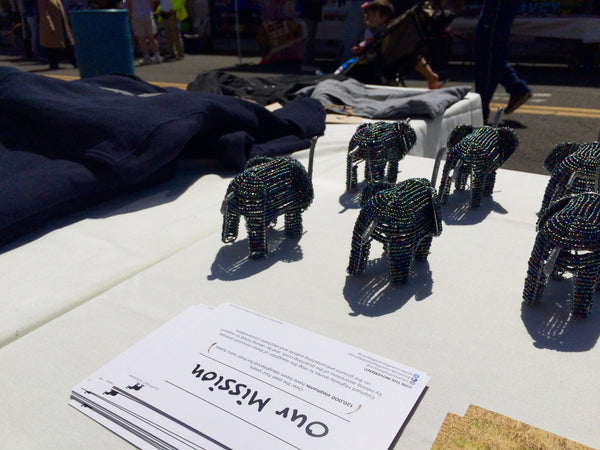Sizing Chart

It was a beautiful day in Kenya when we observed our first herd of elephants. We watched in awe as they gathered at one of the few watering holes that existed during what was the dry season. A mother and her baby approached the hole cautiously as several bull elephants stood guard a few feet away. The four ton mother dropped her trunk to draw up the water and seconds later she squirted the water toward her two year old. It was bath time in the Chyulu Hills and we were privileged to witness the ritual.
Over the next two weeks we saw many elephants. We marveled at how such large mammals could move with such grace and speed. We laughed at their antics, particularly when a tree blocked their path. We listened as our guide, a Maasai elder, taught us about their habits. And we learned how elephants are tracked using their dung and by the paths they make through the bush – their very own elephant highways.
The more we saw of the elephants, and the more we learned about them, the more enchanted we became with these exceptional, intelligent animals. So we were completely horrified when a ranger returned to our lodge one evening and informed us that a female elephant had been shot to death by poachers. “Why?” we asked. “Ivory,” he answered.
Each year, thousands of African elephants are killed by poachers for their ivory tusks. The poachers in Africa receive approximately $330 a kilo for the ivory, but in China, that same kilo sells for over $8,000. What happens to the ivory? It is made into trinkets, jewelry, chopsticks and religious articles. The objects – any of which could be made from materials that do not require elephants to die – are in high demand throughout Asia.
Legal protections for elephants are largely ignored and difficult to enforce. But the high demand for ivory is wiping out elephant populations throughout Africa. If the murder continues at its present rate, there is a very real chance that within 20 years, there will no longer be elephants in Africa. We must stop the madness – and that’s what Elephant Highway is all about.
We founded Elephant Highway shortly after our return from Africa with the mission of raising awareness of the plight elephants face and of raising funds to help anti-poaching organizations fight the illegal trade. As two teenagers (a fifteen and a sixteen year old at the time) it wasn’t easy to get a non-profit organization started, but we were determined to stand with the elephants. We have worked tirelessly since that summer in 2012 to stand with the elephants, and we hope that you will join us in this effort.

Only together can we stop this cruel and senseless violence. Buy a t-shirt, adopt an elephant, and most importantly – spread the word! Tell people about poaching and the threat it poses to elephants. Everything that we do, no matter how small, makes a difference. Elephants have memories that are only rivaled by those of humans, and they truly never forget. Now it is up to us not to forget the elephants.
